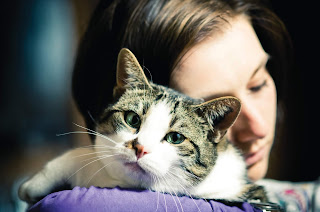With new information still continuously coming out, our team of highly educated & trained veterinarians are here to keep you informed and help answer your questions regarding your furry companions and COVID-19.
o As of now, there is no proof that pets
(including cats and dogs) are capable of infecting humans with COVID-19. A
large commercial lab (Idexx) tested thousands of animal samples from the US,
South Korea, Canada, as well as some European countries and found no positives.
This testing involved over 5,000 samples from 17 countries.
(including cats and dogs) are capable of infecting humans with COVID-19. A
large commercial lab (Idexx) tested thousands of animal samples from the US,
South Korea, Canada, as well as some European countries and found no positives.
This testing involved over 5,000 samples from 17 countries.
Can I get my pet tested for COVID-19?
o
At this time, the USDA and CDC do not recommend
testing pets. Additionally, the Idexx PCR test used to test thousands of
samples is not available for the public, but Idexx will make it commercially
available if leading medical authorities find it clinically relevant to start
testing pets.
At this time, the USDA and CDC do not recommend
testing pets. Additionally, the Idexx PCR test used to test thousands of
samples is not available for the public, but Idexx will make it commercially
available if leading medical authorities find it clinically relevant to start
testing pets.
o
If your pet is showing signs of respiratory
disease, contact a veterinarian immediately. It is important to remember that
there are many, many causes of respiratory disease in cats and dogs, but thus
far COVID-19 does not appear to be one of them. However, be sure to let the vet
staff know if your pet was exposed to a person with COVID-19.
If your pet is showing signs of respiratory
disease, contact a veterinarian immediately. It is important to remember that
there are many, many causes of respiratory disease in cats and dogs, but thus
far COVID-19 does not appear to be one of them. However, be sure to let the vet
staff know if your pet was exposed to a person with COVID-19.
What does it mean that a tiger at the Bronx zoo tested
positive? What about the cat in Belgium or the dogs and cat in Hong Kong??
positive? What about the cat in Belgium or the dogs and cat in Hong Kong??
o
There is ever changing info on COVID-19, so we
will continue to update as more info is available. At this time, these isolated
cases are not a cause to panic or rehome your animals. While there is some
evidence that cats and ferrets may have a low susceptibility to the virus,
there is no evidence it can be transmitted to a human from these animals. More
likely, the humans handling these animals infected the animal. There is no
evidence it can be passed back to a human.
There is ever changing info on COVID-19, so we
will continue to update as more info is available. At this time, these isolated
cases are not a cause to panic or rehome your animals. While there is some
evidence that cats and ferrets may have a low susceptibility to the virus,
there is no evidence it can be transmitted to a human from these animals. More
likely, the humans handling these animals infected the animal. There is no
evidence it can be passed back to a human.
o
Specifically in the case of the Hong Kong dog,
there is more to this story. There were two dogs living in the house. One dog
consistently tested negative, while the other tested “weakly” positive. At no
point did either dog show any signs of respiratory illness. While the weak
positive dog passed away 3 days after being released from quarantine, this dog
had ongoing health issues prior to COVID-19 test; these pre-existing issues
likely lead to this geriatric dog’s death. (https://www.avma.org/resources-tools/animal-health-and-welfare/covid-19/sars-cov-2-animals-including-pets)
Specifically in the case of the Hong Kong dog,
there is more to this story. There were two dogs living in the house. One dog
consistently tested negative, while the other tested “weakly” positive. At no
point did either dog show any signs of respiratory illness. While the weak
positive dog passed away 3 days after being released from quarantine, this dog
had ongoing health issues prior to COVID-19 test; these pre-existing issues
likely lead to this geriatric dog’s death. (https://www.avma.org/resources-tools/animal-health-and-welfare/covid-19/sars-cov-2-animals-including-pets)
Do I need to do anything different with my pets if I am
healthy?
healthy?
o
The short answer is no. Continue to practice
good hygiene (i.e. washing hands after interacting pets, their food, and their
waste). While it may be tempting, be
cautious to not over indulge your pet while in quarantine with them. This means
not feeding them too much food AND not suddenly increasing their exercise
significantly. Try to avoid any abrupt changes in routine that may upset your
pet or interfere with their health.
The short answer is no. Continue to practice
good hygiene (i.e. washing hands after interacting pets, their food, and their
waste). While it may be tempting, be
cautious to not over indulge your pet while in quarantine with them. This means
not feeding them too much food AND not suddenly increasing their exercise
significantly. Try to avoid any abrupt changes in routine that may upset your
pet or interfere with their health.
What do I do with my pets if I am diagnosed with
COVID-19?
COVID-19?
o
You should limit your interaction with pets if
you are diagnosed with COVID-19. If possible, have someone else in the house
care for the pets. If this is not possible, then wear a facemask while
interacting with them and minimize any touching, meaning no snuggling or
hugging. Wash your hands thoroughly before and after any handling of your pets.
You should limit your interaction with pets if
you are diagnosed with COVID-19. If possible, have someone else in the house
care for the pets. If this is not possible, then wear a facemask while
interacting with them and minimize any touching, meaning no snuggling or
hugging. Wash your hands thoroughly before and after any handling of your pets.
o
It is a good idea to have a care plan in place
for your pet should you need to be hospitalized. Consider making arrangements
with another member of the household or arranging for the pet to be cared for
at another home or boarding facility. You should have at least 2 weeks worth of food
and medications your pet may need during this time.
It is a good idea to have a care plan in place
for your pet should you need to be hospitalized. Consider making arrangements
with another member of the household or arranging for the pet to be cared for
at another home or boarding facility. You should have at least 2 weeks worth of food
and medications your pet may need during this time.
o
If your pet has an emergency and needs
veterinary care while you are sick with the virus, have a healthy friend or
family member transport your pet to the vet for emergency care. Any
non-emergent vet visits need to be postponed until you are well to avoid
exposing the essential personnel at your vet’s office.
If your pet has an emergency and needs
veterinary care while you are sick with the virus, have a healthy friend or
family member transport your pet to the vet for emergency care. Any
non-emergent vet visits need to be postponed until you are well to avoid
exposing the essential personnel at your vet’s office.
Written By: Dr. Erin Walsh, Companion Animal Hospital Mount Prospect
Resources:
What's Next
Call us or schedule an
appointment online.Meet with a doctor for an
initial exam.Put a plan together for
your pet.


